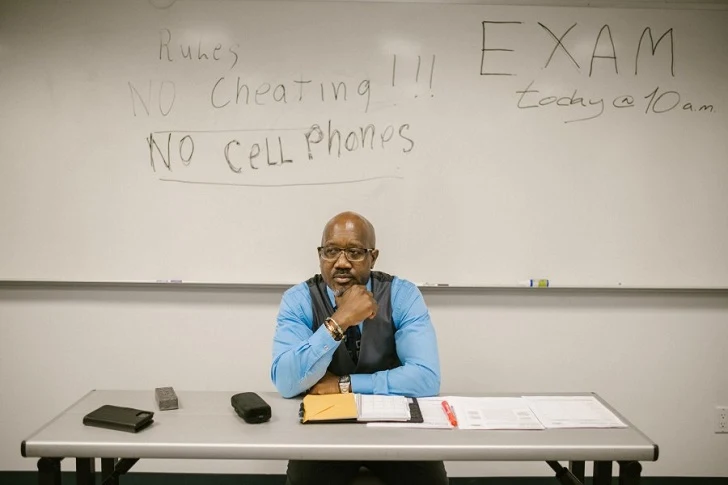I started exam invigilating about three years ago. It's good to have some key earning dates in the diary and I enjoy working in the school environment in a different way. But what does invigilating (or 'invigorating' as my neighbour calls it) involve? Is it just walking up and down looking stern and sitting around picking your nails?
Invigilation starts with compulsory training. Invigilators
have to know the exam board requirements inside out. We also undergo Child
Protection training which is always helpful. Our day starts early as we have to
prepare for the exam hall. For the public exams, each desk is labeled afresh for
every exam, and a photographic ID is placed on the desk matching the seating plan. We
do this in pairs so we can double-check it's correct.
There is usually a range of exams going on in one room so we
check the number of papers and check equipment. We then write up the boards
with the key exam information and times and check the clocks are all in sync
and visible.
Once the students are in, an exam office staff member starts
the exam off. We get the papers and additional equipment out quickly and take
in any contraband including mobile phones and smart watches. It's also
incredible how many students turn up for a Maths exam without a ruler or calculator!
Once the students are off and working we check off each name against the
seating plan and chase up any latecomers.
Then we're on our own. No staff members are allowed in a
public exam and a small group of us are in charge of 200-plus students. It's
probably the only time that many teenagers sit in total silence for hours on
end! This is the quietest part of the job. It's active invigilation so there's
no reading or napping. We walk silently and slowly around ensuring we can see
any raised hands immediately. Our job is to make sure that students have the
best opportunity at succeeding in the exam. I'm a smiley invigilator. If a
stressed-out student looks up I want them to see an open, friendly face rather than someone glaring at them. We mostly stand or walk and only sit if we really need
a rest.
The first hour of the first exam is the slowest. It's
perhaps an indicator of how frantic our lives have become that being quiet and
still for a few minutes at a time is such a challenge. After that, the brain and
breathing slow and your thoughts unravel and become clearer. During this time I
either do (quiet) deep breathing and clear my mind entirely or write or plan in
my head and sometimes I play word games ( I once made over 70 words from the
word Chemistry). Obviously, there's always a part of the brain that is alert to
any movement or hands up. We may have to observe a student and make a note of
how they're getting on every half hour and occasionally there's a toilet break
request, a panic attack, or a nosebleed. Last week we had a student who promptly
fell asleep at their desk. But generally, it's an oasis of calm in a chaotic,
fast-moving world.
The exams may finish at different times so we give a five-minute warning and once the exam finishes and we or the exam staff have
delivered the end-of-exam spiel we collect the papers as quickly as possible.
We check they're in order and take them back to the locked safe room in the
exam office. We tidy the room, clear the boards, and make sure the room is ready
for the next exam.
Yes, it can be boring but there's something about invigilating that is rather rewarding too. Perhaps it's the little oasis of calm in the freelance week, the feeling you're helping a young person take the biggest step of their young lives, just as someone once did that for you. Or perhaps it's the rather good lunch that this particular school provides for its staff and pupils. Either way, I suspect I'll be signing up for this summer's exams again.
